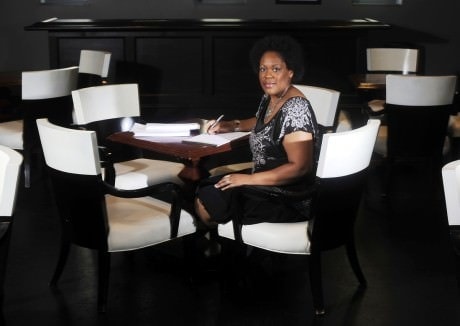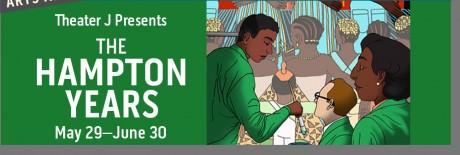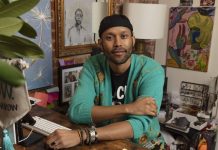Welcome to the new in-depth interview series ‘The Playwright’s Playground‘ – highlighting local female playwrights in the D.C. Theatre community.
Female Theatre artists make up more than 50 percent of those involved in the Theatre, yet the number of female playwrights being produced is dramatically lower. In this series I will interview and introduce DCMTA readers to the many talented playwrights in this area to learn about their writing process, their inspirations, and their motivations, and struggles to write and produce their art.
______
The Playwright’s Playground Series debuts with Jacqueline E. Lawton.

If you are not familiar with the name Jacqueline E. Lawton or her work – get ready! She is a force to be reckoned with and one of the area’s most active playwrights
______
Jacqueline E. Lawton is a critically acclaimed D.C. playwright, dramaturg, and theatre teaching artist. She is recognized as one of the top 30 African American playwrights by Arena Stage’s American Voices New Play Institute, and in 2012, Lawton was named an inaugural group member of Arena Stage’s Playwright’s Arena. (The Playwrights’ Arena is the newest new play initiative developed by the American Voices New Play Institute centered on a small collaborative group of local playwrights dedicated to the support and development of each other’s work).
Earning an acclaimed reputation for writing complex, multilayered, historical material that is urgent and playable, Lawton’s plays include: Anna K; Blood-bound and Tongue-tied; Deep Belly Beautiful; The Devil’s Sweet Water; The Hampton Years; Love Brothers Serenade; Mad Breed; and Our Man Beverly Snow.
Theater J presents the World Premiere of her latest production, The Hampton Years, May 29 – June 30, 2013.
______
In Part 3, and the final interview with the revealing Jacqueline E. Lawton, Jacqueline discusses her love of theatre and the evolution of her playwriting, and shares her views on theatre criticism, her plays, and future projects.
Sydney: What led you to the theater and playwriting?
Jacqueline: Theater and the arts have always been a part of my life thanks to my mother’s love of MGM movie musicals. Amazing artists like Judy Garland, Gene Kelly, Debbie Reynolds, Fred Astaire, Ginger Rogers, Bing Crosby, and Danny Kaye taught me the ins and outs of show business. I’d watch these movies over and over again. I learned the songs, dance steps, and dreamed of one day becoming a performer. I read Shakespeare before I learned it was hard to read. Also, my mother had these amazing craft books. My sister and I made decorations, puppets, and costumes based on different holidays, fairytales, and traditions. We didn’t dress up for Halloween, but a part of our Thanksgiving tradition was to make costumes, sing made-up songs and act out little made-up plays. In elementary school, we took field trips to see plays at the local civic center. The first professional play I remember seeing was Jack and the Beanstalk. I fell in love with the Harp. My family remains incredibly supportive of my theater career.
In Junior High and High School, I continued to write and found opportunities to perform in through UIL Poetry Interpretation and One Act Play Competitions. In college and graduate school at the University of Texas at Austin, I studied theater, playwriting, solo performance, performance studies and screenwriting. I was also a part of The Austin Project, a writing group comprised of women artists, activists, and scholars and led by Sharon Bridgforth and Omi Olomo Osun (Dr. Joni Jones). It was a deeply profound and lasting experience that taught me how theater could be used as a powerful tool for social justice.
During grad school, I traveled to Europe (Ireland, France, and Italy) to write and participated in the Kennedy Center’s Playwrights’ Intensive (2002). At The Kennedy Center, I met the fabulous Gregg Henry and a whole slew of professional directors, designers, actors, and playwrights. From them, I learned firsthand what was possible for me. At World Interplay (Australia), I was introduced to performance styles and traditions from around the world. It was amazing and cracked opened my world view!
Then I moved to D.C., which is a diverse, talented, vibrant, and passionate theater town! Since moving here in 2006, I’ve worked as a freelance dramaturg, playwright and teaching artist and even as an actor, director, and producer on occasion.
How do you balance your work as playwright, dramaturg and teaching artist?
First, I had to learn to say “no.” That wasn’t easy, but it’s necessary. Also, I’m disciplined and stick to a rigid schedule. When I’m working that’s all I’m doing. Ultimately, I’m determined. I want to be a good playwright who writes beautiful plays. I want to be a great dramaturg who helps playwrights tell the story that’s in their heart and serves the production with solid research and analysis. I want to be an excellent teacher, who instills a quest for knowledge and a curiosity for what is new and different. It helps that my parents instilled in me a very high work ethic. If my name is on it, it’s going to be my best work. This is where learning how to say “no” really came in handy. If I take on too much, then I won’t be able to do my best work.
How influential were college, autobiographical events, and your early work history in the details of your writing?
While my personal life experience doesn’t limit the content and scope of my work, it certainly infuses it with a deeper and richer sense of humanity. I’ve written about the self-hatred within the Black community (Blood-bound and Tongue-tied); the Lebanese war of 2006 and the controversial CIA interrogation tactics (The Devil’s Sweet Water); the Booth family and their British American theatrical roots (Mad Breed); the impact of gentrification on inner city youth (Love Brothers Serenade); the war on women and the evolution of a friendship between two women (Noms de Guerre); and the complex relationship between Blacks and Jews (The Hampton Years).
Are there expectations as a black, female playwright to write positive role models? How do you respond to those theater goers, and what responsibility (if any) do you feel you have to the African American community?
When I was in grad school, I would pass by an older black gentleman who sold jewelry at an open air market. Every now and again, I would stop to look at his jewelry and overtime we got to know one another. At the end of all our conversations, he would say to me, “You’re a credit to your race.” This always struck me.
The brilliant Viola Davis was raked over the coals for the playing the role of a maid. There were valid points made on both sides of the argument. First and foremost, Black actors should be given more diverse roles to portray. At the same time, there is nothing shameful or ignoble about portraying the life of a maid. There was a certain period in the history of this country when Black people were not granted access to social mobility. In such circumstances, they did the best they could with what was given to them. These people are no less worthy of having their stories told than anyone else.
As an African American artist, I carry the history, anguish, suffering, accomplishments and success of my people on my skin. I’m aware that I’m writing in a tradition of a people who were marginalized, but the only responsibility I owe to anyone is to tell the truth, my truth. The human story isn’t one of perfection. It is one of great struggle. If we can tell that story beautifully and honestly, then we have done our jobs as artists.
Who has had the greatest impact on your development as a writer?
My parents and siblings, for believing in me and for never once suggesting that I do something else.
My teachers:
–Amparo Garcia-Crow, my first playwriting teacher, showed me that I could be an artist and encouraged me to get an MFA in playwriting and taught me how to write in my dreams.
–Omi Olomo Osun (Dr. Joni Jones) taught me how to use theatre as a tool for social justice. She also introduced me to performance ethnology, which is how I learned how to write interesting and fully evolved people onstage.
–Jill Dolan taught me dramatic criticism and how to be a feminist. She also taught me that there is enormous strength in vulnerability.
How are you affected by what critics say, and how effective are theater reviews in determining if you see a show? How do you digest theater reviews and criticism of your work?
I enjoy critical analysis. Artists should be able to speak critically about their work and frame it within a contemporary, historical, socio-economic, political, racial/ethnic and geographical context. We need to be conscious of the work we’re creating, of what we’re putting out into the world. Reviews aren’t a determining factor in whether or not I see a show. As for my own work, I wait two to three months after a show has closed before reading reviews.
Is there a favorite among your plays?
My two favorites are The Devil’s Sweet Water and Love Brothers Serenade. I enjoy reading them and am aching to see them produced. They’re both politically charged, but are also love stories, adaptations of classical texts and multi-lingual.
The Devil’s Sweet Water is an innovative take on the story of Dr. Faustus. It is a provocative and poetic story about love, friendship, and patriotism in the U.S. and Lebanon post-9/11. The play follows Kamara in her search for love during the summer of 2006. This play highlights the controversial use of torture as a U.S. military and government interrogation method. It also examines the terrifying and detrimental, though human, tendency to lump people with a shared ethnicity, language and religion into one category, despite their many different beliefs.
Love Brothers Serenade is a hiphop infused drama that follows Reynaldo and Ricardo as they struggle for survival and fight to forge their own identities in DC’s inner city ghettos. As these young men come of age, they find comfort, security, and family in the street gangs, drug deals, and violence that surrounds them. Adapted from Giuseppe Verdi’s Un Ballo in Maschera, this play investigates the honor code, loyalty, and rites of passage at the heart of this volatile community. Love Brothers Serenade reveals that the bond of brotherhood has just as much strength to destroy as it does to unite.
Would you ever like to direct your own work? How do you see the relationship between your work for stage and screen?
As of right now, this moment, it wouldn’t be my first preference to direct my own plays. It’s important to have a different perspective on a new play in development in order for it to grow. Also, I really enjoy the collaborative process. While I don’t always agree with choices that are being made, I learn so much about how the world of the play operates from the director, dramaturg, designers, and actors.
What future plans do you have with writing for film and television?
I studied screenwriting in college and am always tempted to dip back into that world. I loved writing screenplays for the depth of creativity and the visual aspect of the work. I’d probably still be doing it if the opportunity to study playwriting hadn’t arose. As for television, it’s such a deliciously rigorous process. I write quickly, which would work in my favor. It’s definitely something that interests me.
We know that The Hampton Years is opening at Theater J on May 29, 2013. What play or other writing projects are you working on now?
I’m really excited about Noms De Guerre, which I’m writing as part of Arena Stage’s Playwrights Arena. It’s a coming-of-age socio-political drama that follows the evolution of a friendship between two women. This play addresses the war on women’s re-productive rights, the ever-changing role of women in society and the impact of PTSD on a marriage. But what excites me most is that I’ll be writing a conservative character for the first time.
I’m also blogging, which has been fun and educational. The focus of my blog is to address issues of race and gender parity in the American Theatre and to feature the talented artists of the D.C. Theatre community. Of course, I’ll toss in a few updates about my own work now and again.
What are your playwriting goals for the next five years?
I want to keep writing new plays; developing them with smart, talented and inspiring theatre artists; and seeing them produced. I want to keep teaching theatre, because I love teaching so much. In terms of what’s next, I have several new plays that I’ve been called to write. Also, I have two Theater for Young Audiences commissions in the works at Adventure Theatre MTC, so that’s exciting. So, I want more of the same, but with a deeper understanding of the process and a richer, more rigorous practice to become a stronger writer and more compelling storyteller.
______
LINKS:
‘The Playwright’s Playground Series’: Jacqueline E. Lawton Part 1 by Sydney-Chanele Dawkins.
‘The Playwright’s Playground Series’: Jacqueline E. Lawton Part 2 by Sydney-Chanele Dawkins
Jacqueline E. Lawton’s website.
The Hampton Years plays May 29-June 30, 2013 at Theater J at the Washington DC Jewish Community Center – 1529 16th Street NW, in Washington, DC. Tickets can be purchased in person at the DCJCC, by calling the box office at (800) 494-TIXS (8497), or by purchasing them online.





